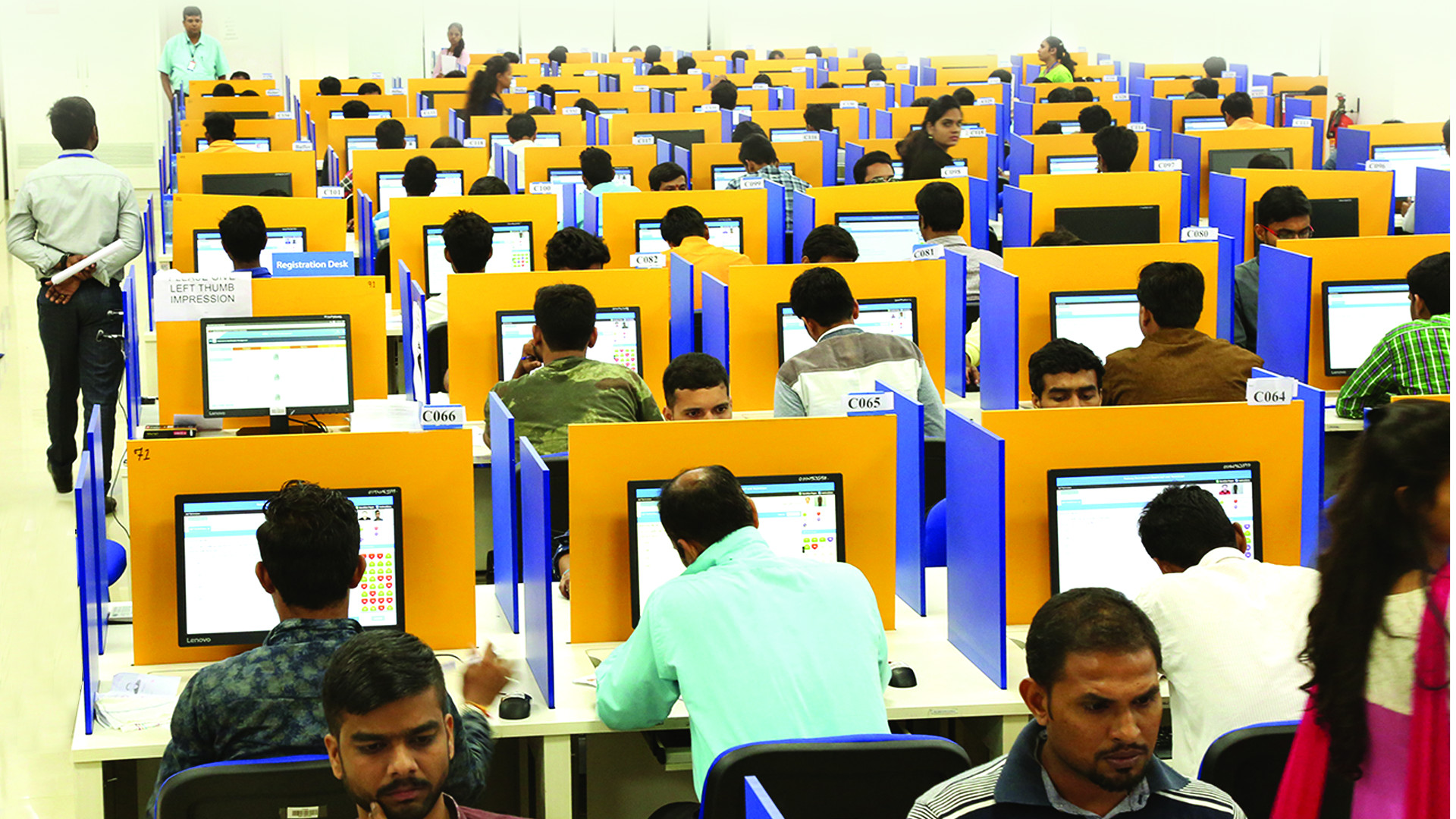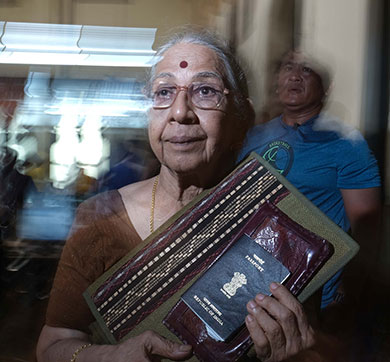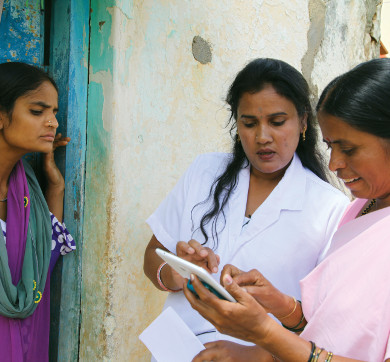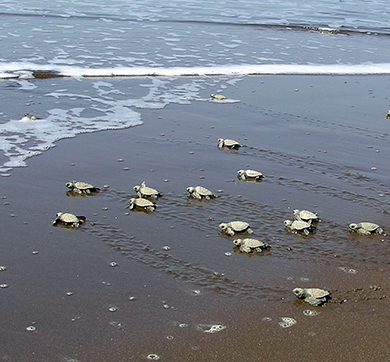December 2018 | 2380 words | 9-minute read
“We have a lot of bruises on our body. We embraced a number of risks and worked with the right set of people who wanted to be the torchbearers of innovation. That’s how we constructed this business,” says Mr Venguswamy Ramaswamy, the global head of TCS iON.
The chief of the business unit since its inception and a veteran of over 25 years at Tata Consultancy Services, Ramaswamy does not want to talk growth or revenue numbers. The real understanding of TCS iON’s journey to becoming one of the world’s largest recruitment assessment models and one of the company’s fastest-growing business units, he believes, comes from the stories.
The idea —like many of TCS’ winning ideas in the past decade — came from Mr N Chandrasekaran, the then chief executive officer of TCS and current Tata Sons Chairman.
“The Chairman gave me a book called the Delta Model: Reinventing Your Business Strategy several years ago,” Ramaswamy says, referring to Arnoldo C Hax’s strategy about separating a business from the herd in pursuit of a unique, creative and differentiated customer value proposition. “I used to run a lot with the Chairman, and during one of those runs he spoke about creating a business model that no one would even think of competing with; he has the habit of pitching long-shot ideas and seeing if somebody catches them. We did; we went ahead and invested in creating a digital platform-centric business model to realise that thinking.”
The result was TCS iON. “The platform was built with a huge set of capabilities, right from the way it can do video and audio questions for assessments to dealing with country-specific nuances, including malpractices and organised crime. That made us grow rapidly,” Ramaswamy says.
Scaling Up
The revenue model for TCS iON’s assessment business is based on the number of candidates assessed. From 30 million assessments in 2014, the number nearly tripled to 85 million by 2016. Today, TCS iON has completed more than 130 million candidate assessments.
More than 85% of all academic admission assessments, including the Common Aptitude Test (CAT) for the Indian Institutes of Management, the Graduate Aptitude Test in Engineering (GATE) for the Indian Institutes of Technology and the Joint Engineering Entrance (JEE) Exam, are executed on this platform.
Recruitment assessments to all public sector banks— including the State Bank of India, the country’s largest; several public service commissions, including the UPSC; the high courts; several police departments in different states and a large number of public sector units also happen on this platform. The most talked about among them is the ongoing assessment for the Railways Recruitment Board, believed to be the world’s largest recruitment drive ever.
“The Indian Railways have more than 100,000 posts to be filled, and 28.9 million candidates applied for it,” Ramaswamy says. “It’s almost impossible for anyone in the world to conduct an exam with 28.9 million candidates at the speed with which TCS iON does. Just imagine the complexity of applications; scheduling, especially in a country as big as ours; and the malpractices. It’s a very tough job.”
The railway recruitment drive, he believes, highlights the “large view” the team took while creating TCS iON: “This is a seven-year old business and to create a digital platform in that time and reach this kind of volume is primarily because there is a pull rather than us pushing. There was a huge unmet need; we went and occupied that vacuum. That’s how we have been able to push the whole game to a different level. Honestly, we don’t sell much.”
Discussing this at the TCS Q2 FY19 Earnings Conference Call in October 2018, Mr Rajesh Gopinathan, chief executive officer, TCS, noted, “The transformation that TCS iON has brought about in recruitment in the country across all elements and the scale that it has been deployed at is unprecedented and absolutely transformative. We are now using that scale to transform our business model… The opportunities to leverage this are practically unlimited.”
Shifting Focus
But that wasn’t always the case. TCS had incubated iON to venture into the small and medium businesses (SMB) segment with a large aspirational goal of reaching $1 billion in revenue in five years.
Ramaswamy, who has been TCS’ global head of SMB Solutions since 2007, says, “We started with manufacturing. The rate of growth of adoption and the challenges that SMB manufacturing companies go through as an industry have an impact on our ability to grow as well. Today, 99 percent of companies in this country are SMBs; the large companies are sub 1 percent. But their longevity is very low; a large number of SMBs start every day, and a vast majority of them eventually die. This industry reality means that when we provide services to them in a model where they pay for what they consume, when they die, it becomes a bottomless pit for us. The rate of growth in such industry sub segments will always be a challenge when compared to others.”
Since the business took time to scale, the inherent agility of the TCS iON platform allowed the unit to swiftly adapt to market dynamics and venture into learning, assessment and recruitment, all businesses that have grown faster than the manufacturing business.
“The challenge is to reimagine that business model to grow faster than what it is doing today,” says Ramaswamy. “Not because it is a low-growth business or not profitable, but because we believe that we need to continuously reimagine the business processes and help create many start-up-to-large-company stories as part of our responsibility to support that segment. We can play a very significant role in that.”

The Business Of Talent Spotting
In September 2018, TCS reimagined entry level college hiring with its National Qualifier Test (NQT). It not only democratises hiring but also brings in the country’s best talent to fuel TCS’s growth plans in line with its Business 4.0 Strategy.
Ramaswamy puts the enormity of it into perspective: “TCS hires approximately 30,000 freshers in the country. The approach that we used to take was visiting 300+ premium colleges across the country before any other companies. We would conduct a test, shortlist them, do an interview, give them an offer and come back. If there was a bright student in Kohima (Nagaland) or Dibrugarh (Assam) or Asansol (West Bengal), s/he wouldn’t come into this process at all.”
The first year of conducting the NQT allowed TCS to reach ~280,000 students from ~1,800 colleges. “This completely changed the way we looked at talent,” Ramaswamy says, listing the advantages. “The quality of talent we are hiring has gone up. NQT increases our ability to improve the joining ratio, which increases the yield from our efforts. And the last and most critical is that what we used to do in about four months, we are now finishing in just three weeks.”
Gopinathan says, “The scale of the infrastructure we have deployed is unparalleled in this country. We have been doing this for commercial purposes through the TCS iON network, and we are now using it for our internal transformation.”
Team TCS iON is already scaling up NQT as a Common Corporate Qualifier Test (CCQT) for both freshers and lateral hires. “We have started certification tests for vocational and professional skills to create a talent pool that can be made available corporates,” says Ramaswamy. “They are all in play with a large number of participants. This has fundamentally changed the way recruitment is seen and executed by corporates.”
Addictive Learning
TCS iON is simultaneously leveraging the wave of digital learning. “First of all, India being the largest learner population in the world is a huge opportunity,” says Ramaswamy. “Secondly, learner requirements and characteristics are changing dramatically, and technology has evolved significantly enough to put a lot of opportunities in the hands of service providers to reimagine learning for them. Keeping these, in mind, we are thinking about how we can make learning addictive.”
They are doing so with products and platforms like the TCS iON Digital Learning Hub, which connects teachers and learners, and by betting on phygital training.
“One of the things that made us think about going phygital is the fact that the number of people who initiate learning and complete it is sub 5 percent today. You will see from public domain and research that this is true of any famous learning portal,” says Ramaswamy. “The second thing is there are a number of topics that are just not possible to learn through a book or a video. These two dimensions inspired us to integrate digital assets and digital knowledge with physical assets and physical interventions.”
The phygital portfolio contains multi-modal learning products across two categories. It recognises that learning is no longer about sitting in a classroom, that multiple people can learn in multiple ways, that learners fall into different categories, and that the content must be customised.
“One category is the TCS iON branded learning products like CCQT, an assessment for getting jobs,” says Ramaswamy. “The second is third-party learning products, where a company or an individual can leverage our platform to reach students, thus expanding the ability to share knowledge.”
TCS iON has also brought the phygital concept to the assessments business by creating two-step assessments, one to test knowledge and one to test application of the knowledge.
“We are expanding very, very fast,” says Ramaswamy. “We are launching a large number of learning products in multiple categories every day. The only thing we have to be careful about is the investment in launching them and the returns that we get out of that investment.”
They are doing so by looking at horizontal-use cases. “This means,” he explains, “today we are using assessment as a product for segments like recruitment bodies and education. But can we also use assessment for pharma companies to drive surveys? We are taking our existing investments in products and platforms and applying it to a large number of industries horizontally rather than narrowly focussing on one or two industries.”
Global Expansion
For the products and platforms that they have built over the last seven years, the biggest market for TCS iON continues to be India because of the sheer number of students, SMBs and manufacturing companies. But over the last two years, they have begun to tap into the international market.
“We first focussed on a narrow set of countries like Indonesia, Japan, the United Kingdom and Ireland,” says Ramaswamy, who wants to find the right mix of developing and developed markets.
The team is now seeing a lot of traction in few other countries. They are initiating ground action in the Middle East, and exploring opportunities in Latin America, where TCS already has a considerable presence, as well as South Africa. They are also doing research in China because of the sheer size of that market for the kind of services TCS iON offers.
“We are seeing an enormous amount of opportunity. All these markets are very big. It’s a question of the management bandwidth we can apply,” Ramaswamy says. “We are looking at a partnership-based model to reach a larger number of countries, and we will continue to localise ourselves to create a large impact.”
Growth Strategy
Investing in phygital: “Putting in enormous amount of investments” to be physically present in 257 cities and counting is viewed as essential to driving a dramatic change and ensuring returns
Betting on platform technology: Rapidly growing affordability, accessibility and reach of technology will exponentially increase the reach of TCS iON products
Learning from retail: TCS iON has adopted the e-commerce strategy of deals for the B2C segment
Building an ecosystem: The ‘Digital Square Strategy’ equates learning with four parts of a puzzle — making career choices, learning, certification, and getting a job.
“The power of learning will always be realised when the learning ends in an outcome,” Ramaswamy says. “We are creating change management to make sure that people see all these things together rather than in isolation.”
He adds, “We asked ourselves is there a way to go to the market and partner with institutes that are imparting knowledge, with people who have knowledge and corporates to create an ecosystem that drives a phygital learning behaviour. These are all partners that we are locking into the system so that learning can be more effective and reach the last mile.”
The 2019 Plan
With several new lucrative contracts, 2018 ended on a high note for TCS iON, and plans are already in motion to carry the momentum into the new year.
First among them is scaling the device strategy. “We have to integrate device strategy into many of our platforms. We have launched a device called ‘PAPER’, whichis in the manufacturing phase. By January 2019, we will have a number of things being done using this device. The initial set of orders are from the UK and Japan. Once we refine it, we will take it big.”
He adds, “We will also put an enormous amount of effort into scaling the lifelong learning products effectively in the coming few months. Those are two important things that I can call out.”
Though Ramaswamy would not discuss growth and revenue projections, he noted, “We should remember that this is one of the strategic growth businesses of TCS. We will talk about growth and revenue figures at some point of time, but for now, it is enough to say that we are one of the fastest-growing units.”
—Monali Sarkar

- Number of candidates assessed in 2018
- 138,000,000

- Size of TCS iON Kolkata centre — the world's largest (in sq. ft.)
- 194,064

- Number of people to be skilled with TCS iON's support to NSDC Skill India
- 400000000








